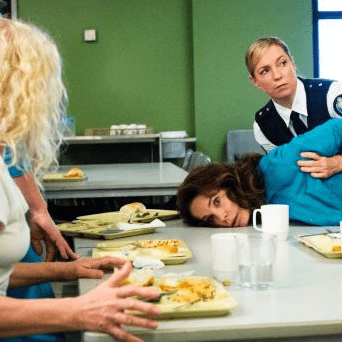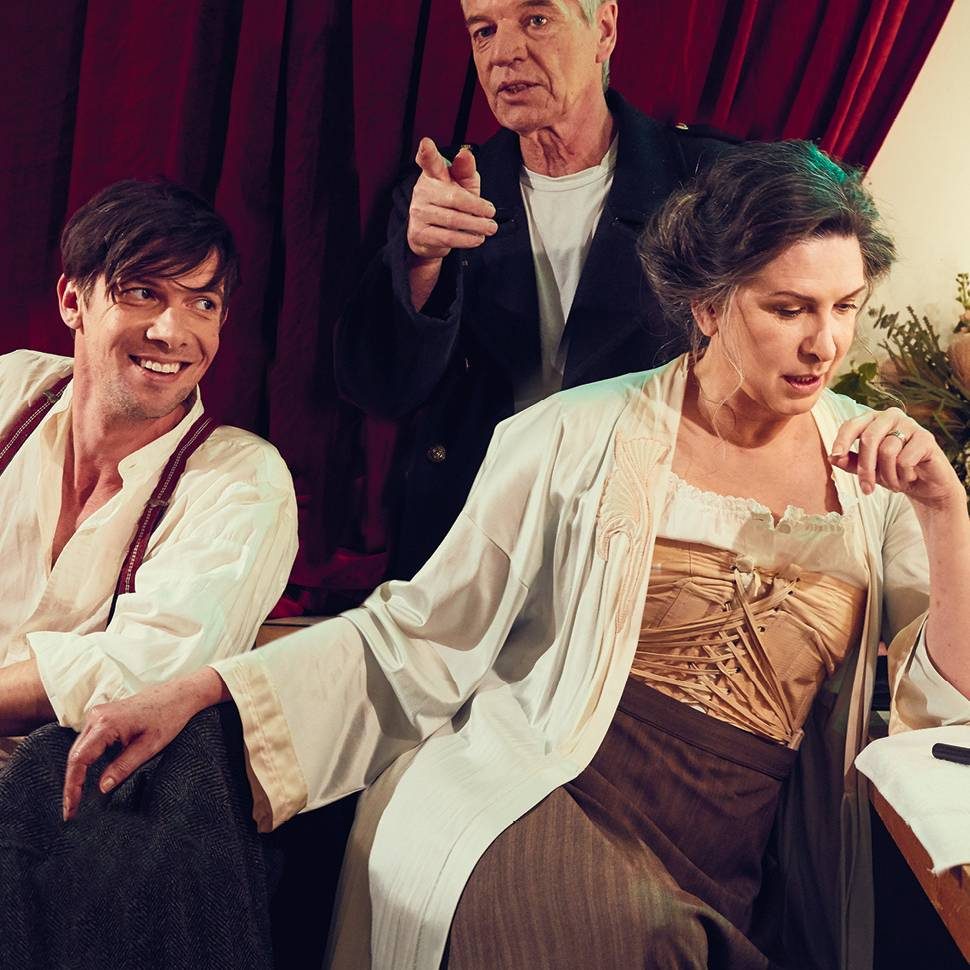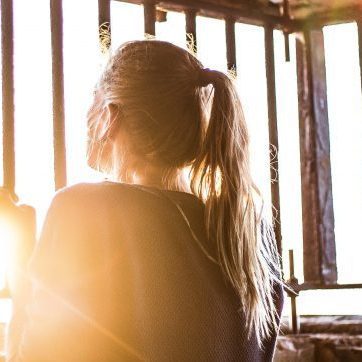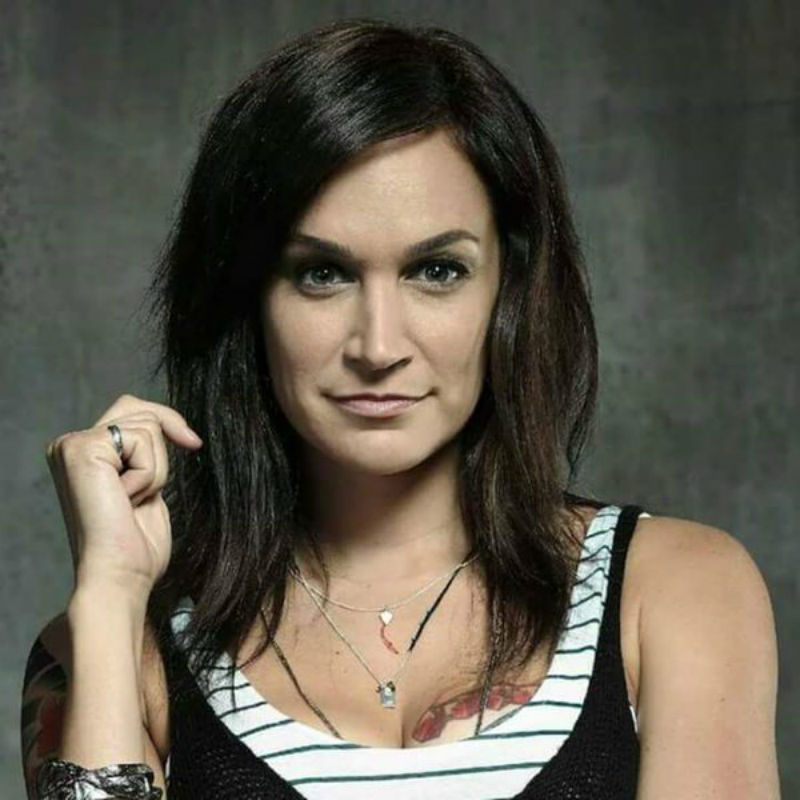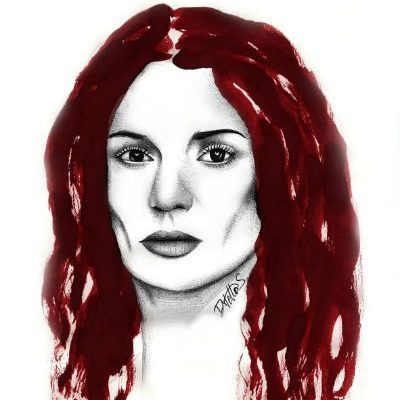
The Wentworth actress on Ballie, sexuality and that season finale
Bea Smith may be gone from Wentworth but Danielle Cormack‘s genuine love and enthusiasm for the show remains. This, along with her warmth and humour, shone brightly throughout the 90 minutes we shared over a coffee and a chat recently.
Bea has been the central character of the Wentworth series throughout the four seasons so far, and arguably the most loved. Why is it that she has resonated with so many people?
I think it’s a testament to the character in that she’s all or nothing. And to be honest, she should resonate. That’s the purpose of the character, she’s the “every human”, and everyone can see parts of themselves in her because she carries us through the journey.
I mean we see it all through Bea’s eyes. She toes the moral line through the show, we go into the prison with her, and so it’s vital that the role of Bea is an anchoring one. And to be an anchor you need to be able to relate to your viewers, and viewers need to be able to relate to that character. I am so glad that Bea has resonated with people like that.
And even throughout Seasons Two and Three, when she’s making the threats and ordering Maxine to bash people, we still see the reasons behind what she is doing and that she’s making careful choices and decisions about things.
Absolutely. There is never anything haphazard about her choices. She’s someone who has a different value system from her predecessors, and it’s interesting to watch that conflict. How does she act as Top Dog; how does she manage the other inmates within the prison walls but still stay true to her own value system? And that’s really hard.
Has it been emotionally difficult playing a character as complex as Bea-one that has been on such a huge arc throughout the four seasons of Wentworth?
She’s certainly been subjected to some pretty extraordinary circumstances, most of which have been incredibly violent, and these have informed where she sits emotionally. But I feel in playing Bea, it’s about staying within yourself and being really present at the moment; that’s really where you find-for me-a performance that’s rooted in a great truth. Its exploration of the experience of the character, of the circumstances, of your surroundings, working with co-workers and their characters make what I do an absolute joy.
In Season Four you go to a place that you hadn’t previously been with Bea and that was to explore a same-sex relationship. Was that something with which you, as a straight woman, were comfortable?
Is that what people would say? That I identify as straight? I’m going to bust something out here. There’s a really interesting conversation around now about gender fluidity and busting down the walls of sexual orientation and people not having to feel like they have to identify with anything-I sit in two different camps around that.
I think it shows that we’re progressing past labels, as in “fuck the labels” as Bridget said to Bea in Season Four. But then I also have a perspective that might be challenging for some people: maybe it is important to identify with a label to make sure people know exactly who they are and not be ashamed of that.
Labels help us to understand the plight of our forefathers and foremothers and sisters and brothers that have actually really fought to be able to say, “it’s okay to be … whatever it is for you.” For me, would I go “I’m straight”? No, I wouldn’t. I mean you could ask my partner now and he’d go: “Hmm? Hetero? Maybe not!”
I’m all for the latest trend of “hey, fuck the labels” as long as it comes from an educated place and there’s knowledge about the history of the journey we’ve come on to get to this place where we are now, and we’re still going on with it. I mean-Jesus-we’re still just getting over Orlando, you know. And people are still running around bashing people because of their sexual orientation. It hasn’t changed.
I don’t need to quantify my sexual history, but I’ve had relationships with people of both genders, long-term relationships, and that’s why the conversation interests me, because people are interested in the place you come from. Then perhaps you’re “there” and then you’re “not there”, and you can become the subject of a great debate.
Thanks for clarifying! I feel sufficiently admonished for making the assumption! People are very curious, especially fans of Wentworth, which has such an enormous lesbian audience, they’re interested to know these things. Also, when you’re in a minority group, being able to latch onto someone that you admire and know they’re like you-it’s very validating.
I am definitely this way but right now I am in a very happy, healthy, beautiful relationship with a man and it’s wonderful.
So back to Kate Jenkinson and “Ballie”. In Season Four, we see the arrival of Allie. The chemistry between the two of you is off the charts!
Is it? Wow, that’s so great to hear!
Some desperate “fan shipping” going on throughout the season.
Yes, I definitely feel the love for the Ballie thing. I shouldn’t say the “Ballie thing”, it sounds so reductive, but about Bea and Allie.
I was quoted as saying “I was interested in exploring Bea’s sexuality” and it was never that, it was about “Bea’s sensuality”, which is a very different thing, because it was never about “is she gay, is she not?” It was more about her allowing someone into her heart that she hadn’t done for a very long time and we had never been privy to on the show.
Bea was confronted with someone who was offering that; someone who was clearly interested in her with an agenda that was really to connect with her. Allie was someone who was really taken by Bea as a person: not because Allie was trying to manipulate Bea about being Top Dog, not because she was trying to get something from her, but because Allie could see something in her that Bea hadn’t actually seen in herself.
Bea’s been so saturated in grief and surviving in this harsh environment, and I was really interested in seeing what would happen when someone tried to unlock that part of her personality, or who she is. And then it starts happening and it leads to that point of ‘oh my god!’
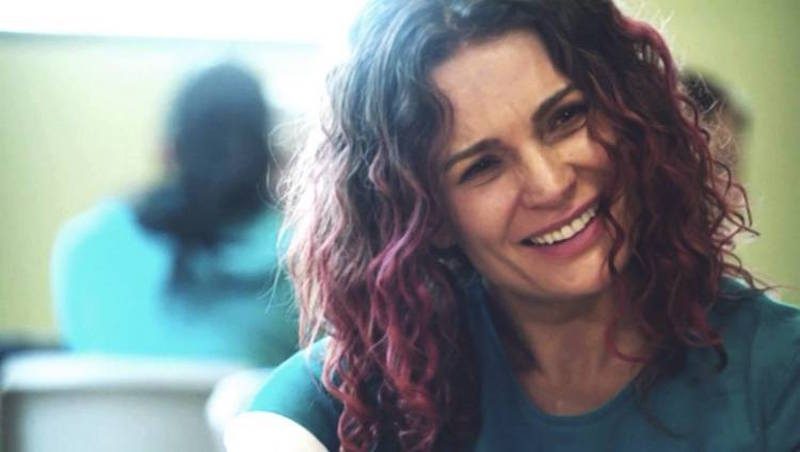
When Bea decides not to resist, I wanted to make it not just about the first kiss with a woman, but just a “first kiss”. Not the first time you ever kiss someone, but like when you meet someone as an adult and it can still be awkward. In the bright light of day, it ignites something that makes you become so “ish”, you know-girlish, boyish-and it’s so innocent and so pure. And it was like trying to find what, in this environment, is going to help us to explore that part of Bea that has been so damaged?
I think with the Bea and Allie relationship there is a beautiful, maternal quality to it, like a sistership and being best friends, which exists in a lesbian relationship that you don’t have in a hetero relationship. It transcends the erotic nature of the relationship, and there’s something else in there that starts to chart other territories. When it goes to the sex and the chemistry, I think that’s where Bea goes “whoa, hold on, where’s this come from?”.It’s frightening and exhilarating and all so new to her, but I also think it feels so right to her.
Now I have to go here and ask this question. Are you aware of the “Bury Your Gays” and “Dead Lesbian” tropes?
Yes, I am, but to be honest, with a show like Wentworth, I think everyone’s fair game.
In this story with Bea and her love for, and relationship with, Allie, my job is to try and shine as much light into the dark recesses of these characters and the storyline regardless of where it goes. So when it is time for any of the lesbian characters in the show to meet a tragic end, it’s our jobs as actors to cast an equitable view on each of those characters. You can’t just look at it as, “oh look, here’s a lesbian character that’s gone”. You can go, no actually she may have died BUT she was also part of the bigger story; she represented so many other things than just being gay.
I think that you’re right with Wentworth in that anyone is fair game. It’s quite different and you never ever know what’s around the corner.
Right, and it’s not my responsibility because I’m not the writer on the show. But as far as my support for any kind of movement that is trying to break down historical oppression in terms of characters and/or ideas, such as this one, then yeah, I see that as my responsibility. I will try and support any movement that is trying to reduce marginalisation and making people invisible.
But then you look at the Bechdel test with women as a marginalised group. What percentage of female characters exist only to inform the male characters or only have conversations that are centred around men? I’m still getting my head around that. My role in any show is to help realise and bring to life a character as much as I possibly can by creating dimension and colour and by honouring the telling of the story. That’s the most important role of an actor: to help tell the story. The audience is there to watch the story.
I agree. It can be quite disingenuous to reduce any characters to merely “being gay”, although it is a conversation that does need to be had in terms of equal representation.
Absolutely, and I embrace the conversation because I think it’s really important-and rightfully so-but I’d also like to think that our show has honoured a huge number of women and represented wide social strata of varied backgrounds, of economic status, of colour, and of sexual orientation. I stand proudly by the show because of that.
One of the strengths of Wentworth is its diversity. People can tune in and see themselves represented.
This is probably why it appeals to such a broad age group and demographic. I sometimes forget that our show has probably one of the more broad demographics of any show that I’ve ever been involved with.
With Wentworth, you expect any characters that have a shred of happiness to have it ripped away from them. Bea’s falling in love she’s a giggly little girl-and then she has it taken away. As an audience we want Bea to have a happy ending. How do you cope with all those emotions?
I think I’m kind of used to it on Wentworth because it’s the lay of the land. You can never get too comfortable, that’s the thing. That’s not the show-it’s, not Better Homes and Gardens! Every time we’d get a new block of the script, it was with great anticipation that I would read it to see what Bea was going to be subjected to in that episode?
But the writers have crafted these episodes so beautifully because they do take these twists and turns-the minute you are comfortable, something comes and rips it right out from underneath you. Then you have to try and piece it back together again to find that place of being comfortable’s so fleeting. I think they craft it so beautifully where they place all those moments; that’s why people stay engaged with the show.
I’d like to talk a little about you.
I thought we did that!
Danielle Cormack is so generous and giving and does so much for the community, for kids, for various charities. Which particular charities do you support, and how do you find the time?
It’s so important to make the time. And by giving I get so much more in return. And I’m well aware that every day on this planet not everyone is doing something they love-they’re doing it for money because it’s a matter of survival. So for me, I think, wow, I’m one of the lucky ones. I’m doing something I really love so I don’t ever take it for granted.
I’m an Ambassador for Child Fund New Zealand and Australia; Ambassador for Shine, which is a foundation for kids whose parents are in prison; and I’ve just become a patron to a new initiative in New Zealand called Bridge the Gap, which is helping kids at risk by giving them a bit of a hand up and educating them to make better choices so that they do not become part of the criminal justice system and avoid that spiral.
And a trip to Cambodia and a 100km walk for charity.
Yes, a 100km walk for Oxfam and a week-long trip to Cambodia to visit communities and schools and raise awareness [of child poverty]through Child Fund.
Your capacity to continue giving is quite incredible. Do you have a final message you can leave with us?
Firstly, thank you! Secondly, “keep your eyes open as you live your life.” For every one that appears to be living an amazing life, there’s going to be another person looking at you saying, “I really need help”. Notice everyone, and notice where they are-be unbiased-a homeless person deserves as much of your attention as a celebrity.
With that, Danielle Cormack bids me a warm farewell as she heads off. I order myself another coffee and sit and ponder the generosity of her final comments: notice everyone. I think she sets a wonderful example.

